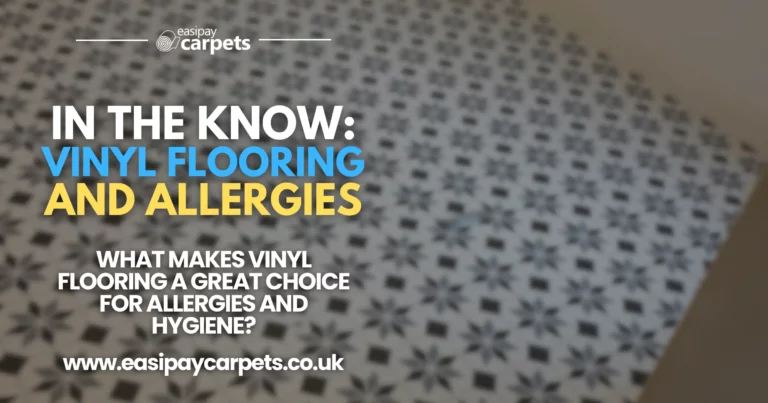

How Vinyl Flooring Helps Allergies
Hello, lovely readers! Today, we’re discussing an important topic for those of us who suffer from allergies: vinyl flooring and its impact on allergies. Whether you or a family member are dealing with seasonal allergies, asthma, or other respiratory conditions, choosing the right flooring can make a significant difference in your indoor air quality and overall comfort. Let’s explore how vinyl flooring can affect allergies and what you need to know to make an informed decision. Ready? Let’s dive in!
Understanding Vinyl Flooring
What is Vinyl Flooring?
Vinyl flooring is a versatile and popular choice for many homeowners due to its:
- Durability: It can withstand heavy foot traffic and is resistant to scratches and stains.
- Affordability: It offers a cost-effective alternative to more expensive flooring materials like hardwood or stone.
- Variety: Available in numerous styles, colors, and patterns, vinyl can mimic the look of wood, stone, and other high-end materials.
Types of Vinyl Flooring
There are two main types of vinyl flooring to consider:
- Sheet Vinyl: Comes in large, continuous sheets and is often used in areas that require waterproof flooring.
- Luxury Vinyl Tile (LVT): Comes in tiles or planks and can be glued down or installed as a floating floor.
Vinyl Flooring and Allergies
Benefits of Vinyl Flooring for Allergy Sufferers
Vinyl flooring can be a great option for those with allergies for several reasons:
- Hypoallergenic Properties
- Easy to Clean
- Moisture Resistance
- Non-Porous Surface
1. Hypoallergenic Properties
Vinyl flooring is hypoallergenic, meaning it doesn’t harbor allergens such as dust mites, pet dander, or pollen. Unlike carpet, which can trap these allergens in its fibers, vinyl has a smooth surface that doesn’t allow them to accumulate.
2. Easy to Clean
One of the main advantages of vinyl flooring is its ease of cleaning. Regular sweeping, vacuuming, and damp mopping can effectively remove dust, dirt, and other allergens from the surface, helping to maintain a cleaner environment.
3. Moisture Resistance
Vinyl flooring is resistant to moisture, which helps prevent the growth of mold and mildew. Mold spores can be a significant trigger for allergies and asthma, so having a flooring option that minimizes the risk of mold growth is beneficial.
4. Non-Porous Surface
The non-porous surface of vinyl flooring prevents allergens from penetrating the material. This makes it easier to keep the floor allergen-free compared to porous materials like carpet or certain types of wood.
Potential Concerns with Vinyl Flooring
While vinyl flooring has many benefits for allergy sufferers, there are a few potential concerns to be aware of:
- Volatile Organic Compounds (VOCs)
- Chemical Sensitivity
1. Volatile Organic Compounds (VOCs)
Some vinyl flooring products can emit VOCs, which are chemicals that can off-gas into the air and potentially cause respiratory irritation or other health issues. To minimize exposure to VOCs, look for vinyl flooring that is:
- Low-VOC Certified: Choose products that have been certified by reputable organizations like FloorScore or GREENGUARD.
- Phthalate-Free: Opt for vinyl flooring that is free of phthalates, which are chemicals sometimes used to make vinyl more flexible.
2. Chemical Sensitivity
People with chemical sensitivities might experience reactions to the adhesives or finishes used in some vinyl flooring products. If you have a known sensitivity, consider:
- Using Low-VOC Adhesives: Select adhesives that are specifically formulated to emit fewer VOCs.
- Floating Floor Installation: Opt for click-lock or floating vinyl planks that don’t require adhesives.
Best Practices for Allergy-Friendly Vinyl Flooring
Choosing the Right Vinyl Flooring
When selecting vinyl flooring for an allergy-friendly home, consider the following tips:
- Look for Certifications
- Opt for Quality Brands
- Consider the Installation Method
1. Look for Certifications
Choose vinyl flooring that has been certified for low emissions and high indoor air quality. Certifications to look for include:
- FloorScore
- GREENGUARD Gold
- Certified Asthma & Allergy Friendly
2. Opt for Quality Brands
Select vinyl flooring from reputable brands known for their commitment to safety and quality. Some brands specifically design products with low VOC emissions and phthalate-free formulations.
3. Consider the Installation Method
If you have chemical sensitivities, opt for installation methods that don’t require adhesives, such as floating floor systems or click-lock planks.
Maintaining Vinyl Flooring for Allergy Prevention
Proper maintenance is key to keeping your vinyl flooring allergy-friendly. Here are some best practices:
- Regular Cleaning
- Using a HEPA Vacuum
- Damp Mopping
1. Regular Cleaning
- Sweep or Vacuum Daily: Regularly remove dust and debris to prevent allergens from accumulating.
- Use a Microfiber Mop: Microfiber mops can trap and remove smaller particles more effectively than traditional mops.
2. Using a HEPA Vacuum
- Vacuum Regularly: Use a vacuum with a HEPA filter to trap allergens and prevent them from being recirculated into the air.
3. Damp Mopping
- Damp Mop Weekly: Use a damp mop with water or a mild, non-toxic cleaner to clean the floor without introducing harsh chemicals.
Additional Tips for an Allergy-Friendly Home
Beyond flooring, consider these additional steps to create an allergy-friendly home environment:
Control Humidity
- Use a Dehumidifier: Maintain indoor humidity levels between 35-50% to prevent mold growth.
- Ventilate Properly: Ensure proper ventilation in areas prone to moisture, such as bathrooms and kitchens.
Choose Allergy-Friendly Furnishings
- Hypoallergenic Bedding: Use hypoallergenic mattress covers, pillows, and bedding to reduce allergens.
- Low-VOC Paints: Opt for low-VOC or zero-VOC paints for walls and other surfaces.
Regular Dusting
- Dust Surfaces Weekly: Use a damp cloth or microfiber duster to remove dust from surfaces.
- Wash Curtains and Linens: Regularly wash curtains, linens, and other fabrics that can trap allergens.
Easipay Carpets can help you get brand new flooring without the high up-front cost – by simply letting you spread the cost of the flooring over time instead. There’s no interest on our plans so you aren’t spending a penny more than you would buying it outright and we include underlay, door trims, carpet grippers and laminate beading for free. Prices start from just £10 per week!
It starts with a free home appointment and quote, to get booked in at a time that suits you, tap the “Get Started” button below and fill out the contact form!
Still Got Questions? Here's 10 FAQs!
Vinyl flooring is hypoallergenic, easy to clean, moisture-resistant, and has a non-porous surface, preventing the accumulation of allergens such as dust mites, pet dander, and pollen.
Unlike carpet, which can trap allergens in its fibres, vinyl flooring has a smooth surface that doesn’t allow allergens to accumulate, making it easier to maintain an allergen-free environment.
Regular sweeping, vacuuming, and damp mopping can effectively remove dust, dirt, and other allergens from the surface of vinyl flooring, helping to maintain a cleaner environment.
Vinyl flooring’s resistance to moisture helps prevent the growth of mould and mildew, which can trigger allergies and asthma. Keeping the floor dry minimizes the risk of mould growth.
Volatile Organic Compounds (VOCs) are chemicals that can off-gas into the air, potentially causing respiratory irritation or other health issues. To minimize VOC exposure, choose low-VOC certified vinyl flooring.
If you’re seeking specifically Low-VOC vinyl flooring, check that is certified by reputable organizations like FloorScore or GREENGUARD, and opt for products that are phthalate-free to reduce chemical exposure.
If you have chemical sensitivities, consider using low-VOC adhesives or opt for floating floor installation methods, such as click-lock planks, which don’t require adhesives.
Look for certifications such as FloorScore, GREENGUARD Gold, and Certified Asthma & Allergy Friendly to ensure the vinyl flooring has low emissions and high indoor air quality.
Regular cleaning is essential. Sweep or vacuum daily, use a HEPA vacuum to trap allergens, and damp mop weekly with a mild, non-toxic cleaner to maintain a clean environment.
Control humidity levels with a dehumidifier, ensure proper ventilation in moisture-prone areas, use hypoallergenic bedding, opt for low-VOC paints, dust surfaces weekly, and regularly wash curtains and linens to reduce allergens.




